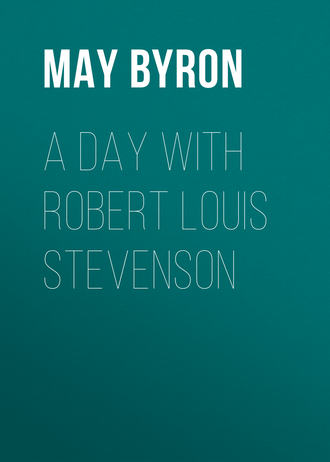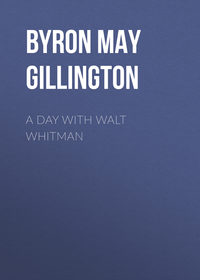 полная версия
полная версияA Day with Robert Louis Stevenson
Generous in criticism, kind in praise, grave and humorous in rapid transition, the amazing scope and variety of Stevenson's writings were excelled by the scope and variety of his talk. "There was no part of the writer that was not visibly present in the man." (Graham Balfour.) He had laid down his opinion that "there can be no fairer ambition than to excel in talk; to be affable, gay, ready, clear and welcome." But none save those who were privileged to hear him, as with quick, impetuous gestures, like a Southern foreigner, he emphasised his phrases, could realise the power, the versatility, the inexpressible, irrepressible charm with which the author could fulfil his "fair ambition."
When the visitors had severally taken their departure, the strong resonant voice, with its Scottish accent and rich, full tones still ringing in their ears, – Stevenson had suffered no abatement in the stream of his exuberant mental vitality. The excitement of conversation had, if anything, keyed him up; and presently, for the writing of a few unavoidable letters, he betook himself to his study; "the study where a smiling God beholds each day my stage of labour trod," and sate himself down there with reluctance.
Correspondence, as a rule, he found but an irksome affair; unless conducted upon his own whimsical lines. "I deny that letters should contain news – I mean mine – those of other people should," was his theory; and he boasted himself of a "willingness to pour forth unmitigated rot, which constitutes in me the true spirit of correspondence." For all that, his letters, grave or gay, remain among the most delightful reading in existence; flavoured with his quaintest conceits, endowed with his most delicate turns of phrase, and often tempered with that "something of the Shorter Catechist" to which Henley had alluded.
For, undoubtedly, as time went on, although Stevenson continued to "combine the face of a boy with the distinguished bearing of a man of the world," he was gradually exchanging the "streak of Puck" and the capricious unconventions of the born Bohemian, for something graver and more mature, – a tendency almost towards the didactic. "'Tis a strange world indeed," he had commented, "but there is a manifest God for those who care to look for Him." And now, "with the passing of years," he observed, "there grows more and more upon me that belief in the kindness of this scheme of things, and the goodness of our veiled God, which is an excellent and pacifying compensation." He was suffering, and in all probability would perpetually suffer, from "that sharp ferule of calamity under which we are all God's scholars till we die": but his patience was impregnable, and his desire to leave a brave example bore him constant company. "To suffer," said he, "sets a keen edge on what remains of the agreeable," and he prepared to enjoy with equal zest all pleasures which were still permitted to him.
As he put away his writing materials, and descended once more to his beloved piano, his father and mother came in. They were living in Bournemouth to be near their only son. The old lighthouse engineer, whose father had built the Bell Rock, who had served under his brother Alan in the building of Skerryvore, "the noblest of all extant sea-lights," who had himself erected Dhu Heartach, was now palpably failing. The spectacle of a stern and honest man slowly evacuating all that he had held of personal strength, was, to his son Louis, a poignantly pathetic one. Their disagreements had been very many and deep-rooted, dating from even before that "dreadful evening walk" in Stevenson's youth, when, "on being tightly cross-questioned," the lad who had been trained for a civil engineer, and had "worked in a carpenter's shop and had a brass foundry, and hung about wood-yards and the like," confessed that he cared for nothing but literature, – "no profession!" as his father contemptuously replied. They had differed on almost every conceivable topic open to their discussion, – yet here, in the fulness of time, they were at peace together, – the austere old man in his second childhood, and the chronic invalid who "must live as though he were walking on eggs." Innumerable ineffaceable traits of similarity bound one to the other; at bottom of all the bygone angers lay a permanent bedrock of mutual love. And perhaps the nearing vision of death which terminated all vistas for both of them, exercised its usual effect, of calm, and laisser-faire, and the equalisation of things: for it is probable that no man has a just sense of proportionate values until he stands in the presence of death.
Stevenson had often alluded, as a matter of personal knowledge, to his constant prescience of mortality, and how it affected a man's thoughts of life. Very seldom has the view of the confirmed invalid, the doomed consumptive, been put forth to the world with the frankness with which Stevenson invested it. He has been sometimes charged with a certain lack of reticence: but in this matter, unquestionably, his candour was to the benefitting of mankind: to whom these close views of the inevitable end are rarely possible under such deliberate and clear-headed conditions.
There is nothing maudlin, nothing hypochondriacal, about Stevenson's treatment of this subject: the same cheerful philosophy bears him up, the same vitality of joy. It is hardly to be wondered at, that some critics handled him seriously, on account of his lightheartedness in the august shadow of the last enemy, – and his inveterate optimism in the face of all calamities. "He jests at scars who never felt a wound," they practically told him, – and could hardly be persuaded to credit the paradox that the man who preached in season and out of season, the gospel of that "cheery old Pagan, Hope," was not a denizen of the open-air, – healthy, athletic, vigorous, incapable of realising the maladies incident to man, – instead of an emaciated, bed-ridden creature, whose smallest pleasures must be measured, so to speak, in a medicine-glass. But, "It is something after all," he has said, "to leave a brave example": and in that he triumphantly succeeded. For the opportunities of meteoric heroisms are few and far between; but every hour beholds the need of those obscurer braveries which may be born of pain and suffering…
In Ordered South and other well-known essays, he shows the gradual relaxation of the ties which bind a man to terrestrial things, – and the curiously significant alteration in his regard for the facts of life, – from the sower in the dank spring furrows, to the sight of little children with their long possibilities before them.
Stevenson had no children of his own. His stepson, Lloyd Osbourne, then at school in Bournemouth, was destined to become his friend and collaborator: but it is doubtful that he cared for children as such. The average small folk, "dragged about in a pleasing stupor by nurses," were very far remote from that superabundant vitality nursed in an attenuated physique, which had sat up with a shawl over its shoulders, so many tedious months in childhood, when its principal habitat was "The Land of Counterpane" and other regions mapped out in the great and glorious world of Make-Believe.
For this reason, the Child's Garden of Verses is not, in any real sense of the word, a child's book at all. It contains the exquisite imaginations of childhood as the grown-up man remembers them: to him they have the charm of the vanished past, they are the utterances of one who has also lived in Arcadia. But to the child, they are the very commonplaces of existence. To sway to and fro in a swing, "the pleasantest thing a child can do," – to bring home treasures from field and wood, nuts and wooden whistles, and some all-precious unidentifiable stone, "though father denies it, I'm sure it is gold," – these are everyday affairs to the country-child, – just as watching the lamplighter is to the town child. To read verses about them is but a waste of time, when one might be actively engaged in similar avocations. But to the grown-man who can never play with wooden soldiers in the garden, never be a pirate any more, – these reminiscences of Stevenson's are a delight unfailing. No one else has ever worded them quite so accurately, quite so simply: and, taken all for all, they are in themselves a summing-up of that most excellent philosophy of this author, "The world is so full of a number of things, I'm sure we should all be as happy as kings!" The world was indeed full of a number of things to R.L.S. and, – passed through the crucible of his own astonishing personality, – they were all, bad or good, transmogrified into things that make for joy.
After eight o'clock dinner was over, the old folks bade good-night, – the father, with touching affection, kissing Louis as though he were a child, and murmuring, "You'll see me in the morning, dearie," as if still addressing that little feeble creature who had been kept alive with such difficulty in the old days at Edinburgh.
The younger man returned to the piano-forte; it drew him like a magnet. For a short time he indulged in his desultory music-making, relishing to the uttermost every success of sound which he achieved: and the happiness, which was his theory of life, radiated in warm abundance from his richly-tinted face and glowing eyes. "It's a fine life," he exclaimed.
At last the day's supply of energy succumbed before the imperious demands of this "fiery threadpaper of a man," and in deference to his wife's suggestion he betook himself to bed. Not necessarily to rest; for even in his dreams his busy brain was working, and his "Brownies," as he termed them, bringing him fresh material for plots. Dr. Jekyll had been thus evolved from three scenes dreamed successively in detail, from which the dreamer waked with cries of horror.
But he did not flinch before the coming night, and anything that it might bring of sickness or unrest. He thought alone upon the past delightful day, fraught with strenuous work and simple pleasures; and he petitioned, in his own words:
"If I have faltered more or lessIn my great task of happiness;If I have moved along my raceAnd shown no glorious morning face;If beams from happy human eyesHave moved me not; if morning skies,Books, and my food, and summer rainKnocked on my sullen heart in vain: —Lord, Thy most pointed pleasure takeAnd stab my spirit broad awake!"(Underwoods.)His wife hovered around him with gentle ministrations, as suddenly out-wearied, Robert Louis Stevenson extended his long, lean form to a possible repose. There was not, perhaps, a cheerfuller man that night in England.
The sea hummed at the foot of the chine, with that soft and dove-like purring of the South-coast sea; the doves made answer with a vibrant cooing in the middle distance of the twilight garden. Spring buds of pear-trees and cherry-trees globed themselves stealthily into blossom; a delicate latent energy was consciously present in the air – the rising of sap and revivification of seed, all the mysterious hidden progresses of April. And the man whose ways were set in a perpetual convergence towards the doors of death, waved, so to speak, a blithe recognition to the myriad hosts of life.
"O toiling hands of mortals! O unwearied feet, travelling ye know not whither! Soon, soon, it seems to you, you must come forth on some conspicuous hilltop, and but a little way further, against the setting sun, descry the spires of El Dorado. Little do ye know your own blessedness; for to travel hopefully is a better thing than to arrive, and the true success is labour." (Virginibus Puerisque.)
The author desires to acknowledge the kindness of Messrs. Cassell & Co., in allowing short extracts to be made from The Master of Ballantrae, The Wrecker, and Catriona; also to thank Mr. William Heinemann for a similar courtesy with regard to St. Ives, and Messrs. Chatto & Windus for their permission to include various quotations from Virginibus Puerisque, Underwoods, and Prince Otto.









